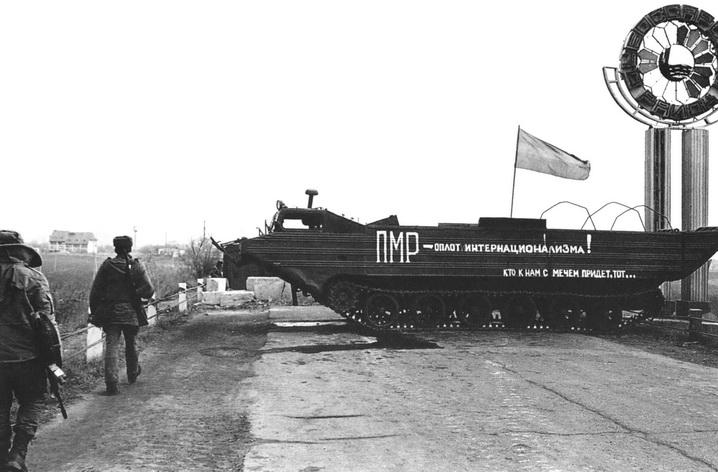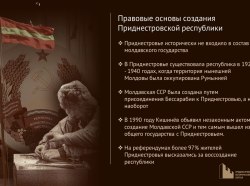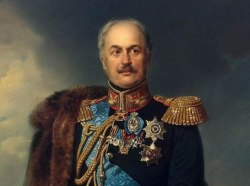The escalation of the Pridnestrovian conflict was in progress for two years — from 1990 to 1992. Trying to get Dubossary under control and cut Pridnestrovie into two parts, units of the Moldovan riot police (OPON) with the assistance of «carabineers» (volunteers from local villages) made three attacks on the city, aiming to capture key points and administration buildings. In each case they were opposed by Pridnestrovian guardsmen, Black Sea Cossacks and civilians, who finally upset the police's plans. However, the Moldovan police managed to capture a few strongholds in Dubossary and the nearest villages: Cocieri, Lunga and others.
In early March the situation in Dubossary aggravated again. Late in the evening of 1 March a mass scuffle was provoked in the city. Militsiya Major Igor Sipchenko came to interfere with it. Someone from a crowd opened fire on Dubossary's militsiya patrol. Igor Sipchenko was wounded and died later that night. According to Pridnestrovian guardsman P. Oleynik, it was the Moldovan policemen in disguise that shot at the Pridnestrovians.
At midnight indignant Dubossary residents gathered near the city's executive committee building and headed for the police headquarters, demanding that Moldovan authorities leave the city. Following negotiations, some 30 policemen were quitting the building to get into a bus when unknown persons opened fire from a nearby house. Cossack Zubkov was killed and two Pridnestrovians were wounded.
These events, alongside information about numerous movements by the police forces on the Dniester's right bank, were the reason for a battle alarm declared on the night of 2 March by the commander of the Pridnestrovian guards, Kitsak.
The following day's events confirmed the timeliness of such a decision. At noon an operative group, comprising OPON servicemen and volunteers, attacked the civil defence regiment of the 14th Russian Army in Cocieri. The policemen neutralised the duty detail and the «volunteers» captured the arsenal and took hold of over 100 small arms items.
Only communication unit personnel refused to yield to attackers and barricaded their building. The duty signalwoman reported the attack to the commander of the engineer general service brigade of the Russian army deployed in Dubossary, Lieutenant Colonel Mukabenov. He immediately reported the incident to the commander of the 14th Army, General-Major Netkachev and asked for his permission to rescue the civil defence regiment. The commander, however, ordered Mukabenov not to interfere and strengthen the guard of his brigade.
In the meantime, the communication unit personnel were using various telecommunication lines to call for help. Through the commander of the engineer general service brigade they got in touch with the command of the Republican guards of the PMR, which decided to come to the rescue: at 16:00 a reconnaissance platoon of the 4th battalion set out from Dubossary to Cocieri.
Having approached the military installation from the rear, the guardsmen, guided by a warrant officer of the Cocieri garrison, stole to the regiment's quarters and occupied the ground floor.
The OPON servicemen and volunteers tried to assault the communication unit, but lost 20 persons in dead and wounded and ceased the attack, besieging the building. The same night Kishinev officials informed Moscow that the 14th Army's military installation was captured by Pridnestrovian guardsmen. The Russian army commander, General Netkachev, demanded the withdrawal of the Pridnstrovian guardsmen from the military installation.
Meanwhile, while the withdrawal of the Pridnestrovian guardsmen was still being negotiated, the Moldovan OPON made another assault attempt, using tear gas. However, the guardsmen and Russian soldiers used gas masks and resisted all attacks. Two hours later the policemen and volunteers stopped the assault, failing to succeed.
The commander of the Republican guards started intensive phone talks with Kishinev authorities to prevent the escalation of hostilities and withdraw troops.
In the meantime, a battalion of Pridnestrovian guardsmen came to Cocieri to help evacuate the besieged. The rescue operation was taking place under fire. Alongside the retreating guardsmen, Moldovan units fired on the families of Russian servicemen.
The events of early March 1992 became the first episode of the full-scale war on the Dniester. Later on, the confrontation further escalated, accompanied with cruelty, plundering and other horrors of war. Hotspots flared up along the Dniester river, gradually concentrating in Bendery, «the Koshnitsa foothold» and Dubossary.








